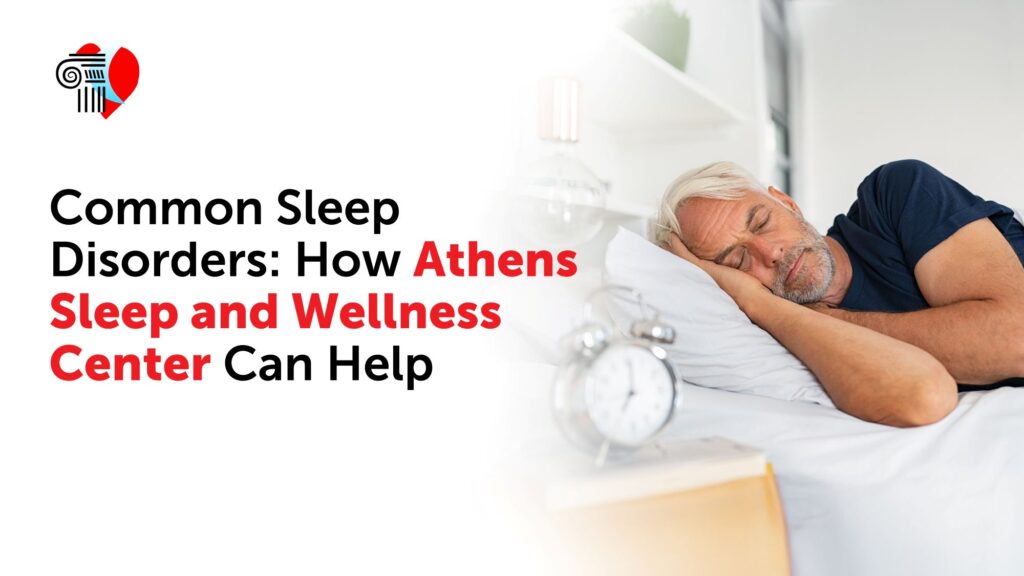Struggling With Poor Sleep? Explore Sleep Medicine Options in Athens
Struggling With Poor Sleep? Explore Sleep Medicine Options in Athens A good night’s sleep is not a luxury. It is one of the foundations of physical health, mental clarity, and emotional balance. Yet for many people, restful sleep feels increasingly out of reach. Difficulty falling asleep, waking up multiple times during the night, loud snoring, daytime fatigue, or feeling unrested even after eight hours are problems that often get brushed aside. Over time, they take a real toll. If you are struggling with sleep issues and live in or around Athens, understanding your sleep medicine options can be the first step toward feeling better, thinking clearly, and restoring your overall quality of life. When Poor Sleep Becomes More Than “Just a Bad Night” Everyone has occasional restless nights. Stress, late evenings, or temporary changes in routine can disrupt sleep now and then. The concern begins when poor sleep becomes persistent. Chronic sleep issues often show up as: Trouble falling asleep most nights Frequent nighttime awakenings Loud snoring or gasping for air during sleep Morning headaches or dry mouth Excessive daytime sleepiness Difficulty concentrating or mood changes Many people normalize these symptoms for years. In reality, they can signal an underlying sleep disorder that deserves medical attention. Why Sleep Problems Should Not Be Ignored Sleep affects nearly every system in the body. Long-term sleep deprivation or untreated sleep disorders have been linked to high blood pressure, heart disease, diabetes, depression, anxiety, and impaired immune function. Poor sleep also impacts daily life in quieter but equally important ways. It reduces productivity at work, increases the risk of accidents, strains relationships, and lowers overall quality of life. Addressing sleep issues is not just about rest. It is about protecting long-term health. What Is Sleep Medicine? Sleep medicine is a specialized field focused on diagnosing and treating sleep disorders. It goes beyond prescribing sleeping pills or offering general lifestyle advice. Sleep medicine looks at how breathing, brain activity, muscle movement, and circadian rhythms interact during sleep. A sleep medicine evaluation is designed to answer one key question: Why aren’t you sleeping well? Once the cause is understood, treatment can be targeted and effective. Common Sleep Disorders Treated in Sleep Medicine Many patients are surprised to learn how varied sleep disorders can be. Some of the most commonly treated conditions include insomnia, sleep apnea, restless legs syndrome, circadian rhythm disorders, and parasomnias such as sleepwalking or night terrors. Sleep apnea, in particular, often goes undiagnosed. People may assume snoring is harmless or simply annoying, when it can be a sign that breathing repeatedly stops and starts during sleep. This disrupts oxygen levels and prevents the body from reaching deep, restorative sleep. Insomnia, on the other hand, may be tied to stress, anxiety, medical conditions, or poor sleep habits. Effective treatment requires understanding which factors are driving the problem. What to Expect From a Sleep Medicine Evaluation Seeking help for sleep problems can feel intimidating, but the process is usually straightforward and patient-centered. A sleep medicine consultation typically begins with a detailed discussion of your sleep history, daily routine, symptoms, and overall health. You may be asked about snoring, breathing patterns, caffeine use, medications, work schedules, and stress levels. In some cases, a sleep study may be recommended. This can be done in a sleep lab or, for certain conditions, at home. Sleep studies monitor breathing, oxygen levels, heart rate, and sleep stages to provide a clear picture of what happens during the night. The goal is not just diagnosis, but understanding how sleep issues affect your daily life. Treatment Options That Go Beyond Sleeping Pills One of the biggest misconceptions about sleep medicine is that treatment always involves medication. In reality, many effective therapies do not rely on sleep aids at all. Depending on the diagnosis, treatment options may include: Behavioral therapy to improve sleep patterns Breathing support devices for sleep apnea Adjustments to sleep schedules and routines Treatment of underlying medical conditions Stress and anxiety management strategies For sleep apnea, devices such as CPAP or alternative therapies may significantly improve sleep quality and daytime energy. For insomnia, cognitive behavioral approaches often provide lasting improvement without long-term medication use. Sleep medicine focuses on sustainable solutions, not quick fixes. Why Local Care Matters in Sleep Medicine Having access to sleep medicine services close to home makes follow-up care easier and more consistent. Ongoing support is often important, especially when adjusting to treatments like breathing devices or making lifestyle changes. For residents of Athens and surrounding communities, local sleep medicine options allow patients to build relationships with providers who understand regional healthcare needs and can coordinate care with other specialists when necessary. This continuity often leads to better outcomes and higher treatment success. Knowing When to Seek Help If poor sleep is affecting how you feel during the day, it is time to take it seriously. You do not need to wait until symptoms become severe. Consider seeking a sleep medicine evaluation if: You feel tired despite adequate time in bed Snoring or breathing issues are reported by a partner Sleep problems have lasted more than a few weeks Fatigue is interfering with work, focus, or mood Sleep is too important to ignore, and effective help is available. A Better Night’s Sleep Is Possible Living with poor sleep can slowly become “normal,” but it does not have to be. Many people experience significant improvement once the underlying cause of their sleep problems is identified and treated. Exploring sleep medicine options in Athens is not about labeling a problem. It is about understanding your body and giving it the rest it needs to function at its best. Better sleep supports better days, clearer thinking, stronger health, and a better quality of life. If sleep has been a struggle, taking that first step toward evaluation could make all the difference.
Struggling With Poor Sleep? Explore Sleep Medicine Options in Athens Read More »


